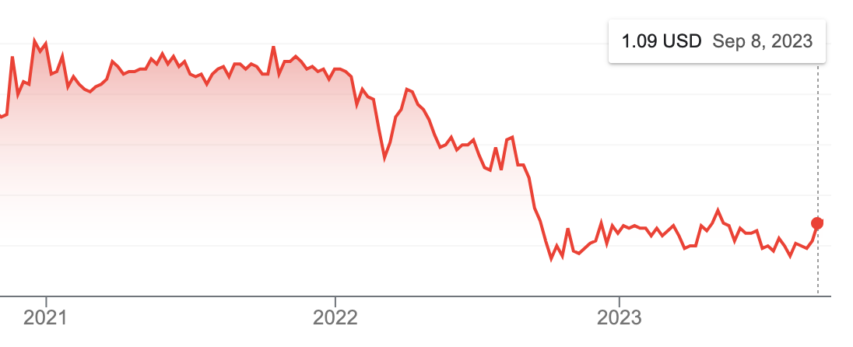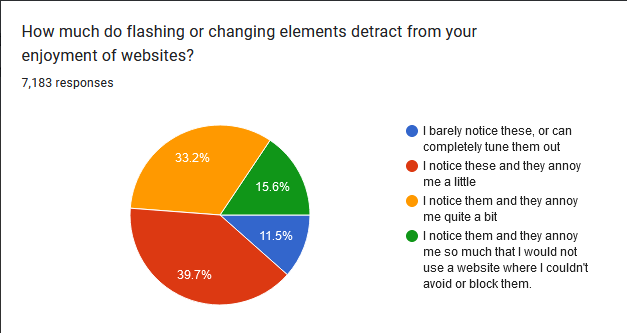So, up top, when I said that Facebook “can’t or won’t” stop this kind of stuff? I lied. There’s no “can’t” about it. It’s “won’t”, for the simple reason that Facebook understands its market and the Daily Mail writers obviously don’t. You’d think that the legendarily trashy British tabloid media would get this — and as I understand it, the Daily Mail is somewhere in the bottom half of the barrel — but Facebook’s market isn’t its users. Not even big companies like Starbucks. Facebook’s market is advertisers, and what they, Facebook, are selling is views. Eyeballs. “Engagement”, I think the Ad Biz term d’art is. In short: It doesn’t matter what the comments are; it matters that the comments are.
Ad company execs are walking into a meeting with a Starbucks-sized company right now. They’re pitching a bold new social media strategy to their clients. And they know it works, these ad men say, because look at all this data from Starbucks. Their posts average so much “engagement” every time, but look, when they post on “social justice” topics, their “engagement” jumps 350%!!
In case you were wondering how all this “social justice” shit keeps appearing in ads, despite the well-known effect of pissing off companies’ established client base, well, there you go — the company execs, being #woke Cloud People, want to do it anyway, and they’ve got whole binders full of data from the marketing department that prove “social justice” ups social media “engagement” with “the brand” umpteen zillion percent.
Severian, “Internet Tough Guys”, Rotten Chestnuts, 2021-05-10.
February 22, 2024
February 14, 2024
“… one of the most contemptible pieces of legislation since the introduction of the Indian Act in 1876″
In the National Post, Stephen Buffalo explains why many Canadian First Nations people are angry with NDP MP Charlie Angus for his recently introduced Private Member’s Bill in Parliament:

“Charlie Angus at convention 2023 2 (cropped)” by DrOwl19 is licensed under CC BY-SA 4.0 .
First Nations people used to consider NDP MP Charlie Angus an ally, as he has been outspoken on issues of Indigenous poverty and government mismanagement. Canadians do not want to know what many Indigenous people are calling him these days.
Last week, Angus tabled a private member’s bill, C-372, that is one of the most contemptible pieces of legislation since the introduction of the Indian Act in 1876. Angus’ proposed fossil fuel advertising act would outlaw oil and gas advertising and the “promotion” of fossil fuels, even by some private citizens. If passed, this would be the most egregious attack on civil liberties in recent Canadian history.
It is astonishing that an experienced parliamentarian like Angus could bring such nonsense forward. All Canadians, of all political stripes, should be outraged at this attempt to stifle public discussion.
Through actions like this, Angus and his environmental supporters — like the Sierra Club, Suzuki Foundation, Earthjustice, Greenpeace, 350.org and others — have shown themselves to be no fans of Indigenous peoples. These single-minded environmentalist organizations ignore the interests of First Nations, Metis and Inuit communities, except when they want to impose their will on them.
Angus has thrown his lot in with the wrong people. They are happy to tell us what to do on energy and environmental matters. But they are never around to fix our water issues, health-care problems, housing crises and rampant drug challenges. They clearly want Indigenous people to stay silent and follow their lead. No wonder many Indigenous folk describe environmentalists as the “new missionaries”.
While some of our members share the views of Angus and his ilk, most First Nations people support carefully managed resource and infrastructure development. We need our own resource revenue to break free from our dependence on government and to chart our own futures. Indigenous communities finally have prosperity and independence in sight.
People like Charlie Angus may agonize over our hardships, but they are content to maintain the Indian Act-style paternalism that created so much of the pain we endure. They must back off. First Nations, Metis and Inuit folk will not accept being shut up and will not tolerate people trying to tell us how to use our land and our resources.
February 11, 2024
Charlie Angus, Canada’s one-man campaign for struggle sessions, re-education, and prison for people who say things he doesn’t like
In the National Post, Tristin Hopper imagines the inside thoughts of NDP MP Charlie Angus, who introduced a Private Member’s Bill this week to criminalize speech that even hints at not being fully onboard with Team Climate Catastrophe, especially anything supporting the use of fossil fuels:

“Charlie Angus at convention 2023 2 (cropped)” by DrOwl19 is licensed under CC BY-SA 4.0 .
Monday
It’s an odd thing to work in the House of Commons; a place where the country’s most cynical, power-mad misanthropes are gathered together into one distilled mass of treachery.This is why I aligned myself with the only true bastion of moral rectitude in this wretched, faithless town. The NDP does not court power, and thus remains untainted by it. Only by insulating ourselves against the corrupting lure of ambition can we truly know we are on the right side of history.
And today, more than ever, I know the only true moral course is to introduce a federal program of jailing any Canadian who expresses positive opinions of a non-renewable fuel source. Not every Canadian, mind you, just those who can’t provide evidence that an oil company doesn’t indirectly benefit them in some way.
Tuesday
As predicted, the usual agents of disinformation have libelled my bill as “illiberal” or “fascistic”. We’ll prescribe appropriate criminal consequences for this kind of mendacity in due course, but for now I would only ask these deceit-merchants to consider what we’re up against.Oil companies are, quite literally, the knowing architects of the complete destruction of the human race. If the so-called “market” had been left to its own devices, the world would currently be a utopia of bottomless green energy. But instead, the oil and gas industry has tricked humanity into believing that fossil fuels are bringers of anything except slavery.
Against this kind of perfidy, I was forced to devise legislation that was broad enough to eliminate any conceivable loophole. If we banned pro-oil commercials, they would simply pour their advertising dollars into billboards. If we banned billboards, they would start embedding secret pro-gasoline messages in popular music. If we banned that, they would train armies of crows to attack e-cyclists while cawing the words “Suncor” and “pipelines”.
And you know what they would say when I tabled a bill to ban the attack crows? They would call it “illiberal”.
February 8, 2024
North American newspaper economics
Tim Worstall discusses some of the issues ailing Canadian and American newspapers which are not easily solvable (government subsidies, as attempted in Canada, just turn the recipients into an underpaid PR branch of the governing party … not a good look in a democratic nation):
So, as a little corrective, a quick jaunt through what actually ails American journalism. The concentration is upon the big newspapers because that’s where the problem is worst. The conclusion is that it’s gonna get a lot, lot, lot, worse too. Because the industry is facing a base economic problem that it’s not willing to actually face up to. Or, at least, all the journalists writing about it aren’t — there’s the occasional sign that some of the business side of the equation grasp it.
[…]
Before Y2K American newspapers were segmented along geographic lines. The size of the country, the lack of a long distance passenger railroad network, meant that this was just so. If you’re printing a daily paper then you’ve got to deliver it daily. On the day it’s meant to refer to as well. If Chicago is 1,100 miles (no, I’ve not looked it up but that’s within an order of magnitude of being right, which is better than many newspapers manage with numbers) from New Orleans then the same newspaper is going to find it difficult to print and deliver to both markets. Add in the fact that trains take a week to traverse that distance, passenger trains – anyone who has ever travelled Amtrak will say it feels that long at least — included.
You could not and therefore did not have national newspaper (USA Today, with satellite printing plants, was an attempt to deal with this and slightly earlier than our cut off date but doesn’t change the basic story) distributions. What you had was a series of local and regional monopolies. Each one centred on a large population centre and serving the area around it that could be reasonably reached by truck overnight. Chicago and Cincinnati, not 1,100 miles away from each other, did have entirely different newspapers.
By contrast, and just as an example, the British newspaper market was national from pre-WWI. We simply did have overnight at worst passenger rail that covered the country. Partly it’s a much, much, smaller place, partly the passenger rail system was just different. So, printing overnight (and some maintained separate Scottish editions and plants) meant that those papers that came off the press in London at 8pm were on sale in Glasgow at 8 am, those that came off the press in London at 4 am were on sale in London at 8am. That’s not exact but it’s a good enough pencil sketch.
Cincinnati newspaper(s) served Cincinnati. Chicago, Chicago and New Orleans the area of New Orleans. There simply wasn’t a “national press” in the US in that British sense.
OK. But this also meant that American newspapers were much more like a monopoly in their local area than anything else. Network effects still exist even before computer networks after all. The most important of which was the classifieds.
As with Facebook, we’re all on Facebook because everyone else is on Facebook. So, if we’re to join a social network we’re going to be on Facebook where everyone else is — except those three hipsters who are where it isn’t cool yet. This applies to classifieds sections. Folk advertise in the one with the most readers, the widest market. Readers buy the one with the most ads in it, the widest market. You advertise the bronzed baby shoes, unused, where there are the most people looking for bronzed baby shoes, unused.
So, the dominant paper will suck up the classifieds in any particular market. Classifieds, fairly obviously back in the days of prams, cheap used cars, waiters’ jobs and so on being geographically based.
No, this is important. A useful pencil sketch of American newspaper revenues pre-Y2K was that subscriptions produced some one third of revenues. They also, around and about, covered print costs and distribution. They were, roughly you understand, about a face wash in fact.
Display ads produced another one third and classifieds the final one third. Classifieds were also wildly profitable — no expensive journalists to pay, no bureaux, just a few women waiting to get married on the end of the phone line.
September 25, 2023
September 23, 2023
QotD: In which we discover why they’re called antimacassars
“Antimacassar” is such a lovely Victorianism. We still have antimacassars — they’re those pieces of protective fabric you see at the top of your train or plane seat — but do you know why antimacassars are so called? Because in the nineteenth century Rowland’s Macassar Oil became such a popular unguent for gentlemen’s coiffures that the land was full of oily-haired chaps who, upon entering your drawing room, would settle back in your favorite chair — and uh-oh, there goes the fabric. Hence, the vital deployment of the antimacassar. Rowland’s Macassar Oil was one of the first products to be marketed nationally (and, indeed, internationally), and so universally known that Lewis Carroll put it in Alice Through the Looking-Glass:
His accents mild took up the tale:
He said ‘I go my ways,
And when I find a mountain-rill,
I set it in a blaze;
And thence they make a stuff they call
Rowlands’ Macassar-Oil –
Yet twopence-halfpenny is all
They give me for my toil.’Better yet, in Don Juan Lord Byron managed to rhyme it:
In virtue, nothing earthly could surpass her
Save thine ‘incomparable oil’, Macassar!Mark Steyn, “Self-Knitting Antimacassars”, Steyn Online, 2019-08-02.
September 18, 2023
It turns out that buying up the rights to old rock songs wasn’t a good investment after all
Ted Gioia enjoys a little bit of schadenfreude here because he was highly skeptical of the investments in the first place, although the geriatric rockers who “sold out” seem to have generally made out like bandits this time around:
Back in 2021, investors spent more than $5 billion buying the rights to old songs. Never before in history had musicians over the age of 75 received such big paydays.
I watched in amazement as artists who would never sell out actually sold out. And they made this the sale of a lifetime, like a WalMart in El Paso on Black Friday.
Bob Dylan sold out his entire song catalog ($400 million — ka-ching!). Paul Simon sold out ($250 million). Neil Young sold out ($150 million). Stevie Nicks sold out ($100 million). Dozens of others sold out.
As a result, rock songs have now entered their Madison Avenue stage of life.
Twisted Sister once sang “We’re Not Gonna Take It”. But even they took it — a very large payout, to be specific. A few months ago, the song showed up in a commercial for Discover Card.
Bob Dylan’s song “Shelter from the Storm” got turned into a theme for Airbnb. Neil Young’s “Old Man” was rejuvenated as a marketing jingle for the NFL (touting old man quarterback Tom Brady).
Fans mocked this move. Even Neil Young, now officially a grumpy old man himself, expressed irritation at the move. After all, the head of the Hipgnosis, the leading song investment fund, had promised that the rock star’s “Heart of Gold” would never get turned into “Burger of Gold”.
That hasn’t happened (yet). But where do you draw the line?
I was skeptical of these song buyouts from the start — but not just as a curmudgeonly purist. My view was much simpler. I didn’t think old songs were a good investment. […] But even I didn’t anticipate how badly these deals would turn out.
The more songs Hipgnosis bought, the more its share price dropped. The stock is currently down almost 40% from where it was at the start of 2021.
Things have gotten so bad, that the company is now selling songs.
On Thursday, Hipgnosis announced a plan to sell almost a half billion dollars of its song portfolio. They need to do this to pay down debt. That’s an ominous sign, because the songs Hipgnosis bought were supposed to generate lots of cash. Why can’t they handle their debt load with that cash flow?
But there was even worse news. Hipgnosis admitted that they sold these songs at 17.5% below their estimated “fair market value”. This added to the already widespread suspicion that current claims of song value are inflated.
September 1, 2023
QotD: Process thinking about the Russo-Ukraine war
Process thinking has goals, of course, but they’re all interpersonal. The outcomes, small-o, of Process thinking all have to do with relationships within the group. Why are there blacks in ads for camping gear, despite no black person ever having gone camping in the history of the human race? Because the set designer assumes the writer wants it, and the writer assumes that the creative director wants it, and the creative director assumes the client wants it … which he does, but only because he in turn assumes that the creative director wants it, and etc. To return it to politics, it’s all Narrative.
Combining them, consider the Ukraine Narrative as one giant ad campaign. The lack of Outcome-thinking hit all of us from the very moment it became The Current Thing. What, exactly, are we doing in Ukraine?
Note that there is a case to be made. I don’t agree with it, obviously, but I can make one, and of course it’s ruthlessly Outcome-driven: In a world where States have no friends, only interests, it is consistent with Realpolitik to weaken your rivals when it can be done at low cost and minimal risk. We’re doing to Russia what Russia (and China) did to us in Vietnam — they were quite open about aiding their fraternal socialist brothers in the struggle against Capitalism and Western Imperialism.
One can — and of course in this case would — argue that fucking around in Ukraine is neither low-cost nor low-risk, but that too is Outcome-thinking. You can persuade me, an Outcome thinker, with facts and reason. Steve Sailer is almost a caricature of an Outcome thinker at this point, and he’d be just super at demolishing my hypothetical Realpolitik argument for US aid to Ukraine.
But not only do the Process-“thinkers” in [Washington, DC] not have an Outcome in mind, it never crossed their minds to have one in the first place. This is why I keep coming back to Jaynes [Wiki]. We — normal people — keep trying to assign goals to people like Victoria Nuland. The only goals we can come up with, though, are bugfuck insane — she seems to really believe that not only can Ukraine win the current conflict, but that they’ll march all the way to Moscow, Regime-Change everyone, and invite all the Western parasites in to carve up the country …
… nothing else makes sense, but “sense” left the building with Elvis. There is no Outcome. Which is likelier:
- that she has some top secret Master Plan in a manila folder in a safe somewhere, that reads “Ukraine captures Moscow; Exxon CEO is on the first flight in”; or
- Her behavior seems purposive the way the eerily coordinated gyrations of a school of fish or a flock of birds seems purposive? It looks coordinated, but it can’t actually BE coordinated — it happens too fast for all the individual members to process the signals.
I’ve done a lot of Ukraine shit in the stoyak roundups, and I have never once seen a Victory scenario. The closest even the wildest-eyed optimist comes is very clearly Underpants Gnome shit:
- Send Wunderwaffen to Zelensky
- ???
- Victory!!!
And the third term — the crucial one, Victory — is never ever defined. Let’s assume the Wunderwaffen work and the Big Spring Counteroffensive that they’ve almost literally been advertising, Mad Men-style, goes off flawlessly. What then? At what point do we call off the dogs? Again, unless you seriously believe in Victoria Nuland’s Master Plan — a real document in a real safe, that she got Brandon’s puppeteers to forge his signature on — there simply IS no answer. Their “plan” for “victory” on the battlefield is exactly the same as Bud Light’s “plan” for “victory” with the [Dylan Mulvaney] ads.
It’s all Narrative, all Process. The only outcomes anyone involved considers are all small-o, and they’re all interpersonal. Nobody thinks about battlefield victory — the actual movement of lines on a map, let alone the reality of fighting and dying. But they obsess over being seen to believe in victory. To return to Geo. Orwell‘s commentary:
Creatives spend perhaps half their time in protracted meetings where the primary activity is herding cats, making sure everyone agrees on the current direction of things … until the direction changes, a couple of hours later.
And everyone is fine with this, because everything of importance happens interpersonally.
I’m going to reuse this quote, but this time quote it in full. Two paragraphs, and they’re long, but extremely important. Here’s the first:
The art directors and copywriters who dream up what you see in commercials tend to have a few things in common. The copywriters imagine themselves future screenwriters or novelists, the art directors imagine themselves movie directors eventually. For them, every commercial is a little self-contained movie with a plot and characters, even though no one in the real world gives fifty milliseconds of thought to the character of the TV housewife using that new dustbuster. They very seldom discuss sales, in the sense of “Will this sell more widgets?” In fact they mostly loathe “hard sell” advertising, where you emphasize price.
Emphasis mine, because the question “Will this sell more widgets?” is the definition of Outcome thinking. And if you’re trying to herd cats — as anyone who has had to endure this kind of meeting knows — measurable results are the enemy. Because I really want you to consider the answer to the following question: What’s in it for you, personally, if Acme Corp. sells a thousand more widgets?
Unless you’re a salesman on commission, the answer, for all practical purposes, is: Nothing. Maybe a small bump in your end-of-year bonus, if you get a year-end bonus, but that’s the absolute best case scenario: Another hundred bucks on a single paycheck, six months down the line.
And while I’m certainly not going to sneeze at a hundred dollars, consider what that Benjamin cost you. Half the office hates you now, because you were right. You’re smarter than them, you bastard, and now they know it. You showed them up. Oh, and you’ve also alienated the other half of the office, because what should have been a thirty minute meeting stretched for two hours because you stuck to your guns. Thanks, asshole, I got caught in rush hour and didn’t get home until 7:30. I hope you choke on your $100 bonus. (And don’t think you’re going to get any love from the people who agreed with you in the meeting from the get-go, because they’re all jealous they didn’t think of it themselves).
Now consider the second paragraph, that gets to the heart of Process thinking:
They [“creatives”] favor “conceptual” advertising, where instead of telling you why this cellphone is superior to another, they show you an ironic or cute story involving the cellphone, or maybe you merely show exciting, vibrant people dancing with the thing, with bright colors and music video tropes. This goes back to the recent discussion here of cultural conformity and “mood boards”. Mood boards have been a very big thing in advertising, even more so than twenty years ago. “Look and feel” takes precedence over most things, especially in corporate, nationwide campaigns. For example, you will see Lexus nationwide commercials where the car drives heroically through some surreal industrial or desert landscape, with extreme lighting and lots of flashy cinematography. Local dealer ads for Lexus will concentrate on terms and pricing, and art directors hate doing local dealer car ads. Not artsy enough.
“Conceptual” ads are collaborative ads. With Outcomes, you’re either right or wrong; it either sells more widgets or it doesn’t, but everyone contributes to “mood”. No one can be proven right via sales figures, but no one can be proven wrong, either. Jane sucks at Outcome-driven advertising, because none of her ads moved the sales needle. But Jane is great at “mood boards”; Jane’s a real team player; Jane makes everyone in the meeting feel special. When Jane runs the meeting, we achieve consensus in thirty minutes. When you run the meeting, Mr. Will This Sell More Widgets, it goes on for hours, and we never get the answer — IF we get the answer — until the next quarter’s sales figures come in.
Apply that to the Ukraine Narrative, and test it against Nehushtan‘s heuristics:
“We have always been at war with Eurasia”: what you have to support turns on a dime and doesn’t have to be consistent with anything that went before.
Check. What you “believe” changes as the “mood board” changes, and the “mood board” changes as the group consensus changes in the pitch meeting. We’re all susceptible to this to some degree — someone with stronger Google-fu than mine can no doubt find that old psych experiment from the Fifties, with something like Müller-Lyer lines. No doubt you recall hearing about it: They planted some kids in the crowd who insisted that the shorter lines were really longer, and since these kids were absolutely adamant in their “belief”, eventually most of the class “agreed” that the shorter lines were actually longer.
That’s all consensus stuff, Process stuff. What does it really cost me to say that the shorter line is actually the longer? If it’ll get Jane to finally shut the fuck up, ok. If Jane happens to be really popular, and especially if I think agreeing with her will get me closer to her panties, then the faster I’m going to agree. And if Jane happens to hold my entire career in her hands, and can get me kicked out of the Cloud, to wander the Cursed Earth among the Dirt People …
“Two Minutes Hate”: doesn’t matter who or what the target person is, they are always slotted into the same role, given the same attributes, and the same criticisms are made of them.
Severian, “What is Leftism? (and what to call it?)”, Founding Questions, 2023-05-30.
July 20, 2023
QotD: Advertising to a semi-captive audience
You know how drug companies pay six or seven figures for thirty-second television ads just on the off chance that someone with the relevant condition might be watching? You know how they employ drug reps to flatter, cajole, and even seduce doctors who might prescribe their drug? Well, it turns out that having 15,000 psychiatrists in one building sparks a drug company feeding frenzy that makes piranhas look sedate by comparison. Every flat surface is covered in drug advertisements. And after the flat surfaces are gone, the curved sufaces, and after the curved surfaces, giant rings hanging from the ceiling.
The ads overflow from the convention itself to the city outside. For about two blocks in any direction, normal ads and billboards have been replaced with psychiatry-themed ones, until they finally peter off and segue into the usual startup advertisements around Market Street.
Scott Alexander, “The APA Meeting: A Photo-Essay”, Slate Star Codex, 2019-05-22.
July 7, 2023
June 29, 2023
When “flashy” became “constantly flashing”, the user experience got significantly worse
Scott Alexander on the irritating advance of meaningless flashing elements on so many web pages where they serve no real purpose, but successfully generate anger in their users:
Everyone hates flashing banner ads, but maybe they’re a necessary evil. Creators want money, advertisers demand a certain level of visibility for their ad buys, maybe sites are willing to eat the cost in user goodwill. Fine. But what’s everyone else’s excuse?
A few days ago I needed to look up an obscure point of Jewish law, as you do, and found this Jewish law website:
The background toggles every few seconds between a picture of a rabbi and a picture of … a different rabbi? There’s no conceivable benefit to this and it makes it almost impossible to concentrate on the text.
I used to think I must be the only person who worried about this; maybe it was a weird OCD thing. But I asked about it on the ACX survey …
… and 88% of people find them at least a little annoying! 16% of people go all the way, and say they wouldn’t use a website that has them!
Yet websites have been adding them to more and more parts of the user experience. Most aren’t as blatant as the Jewish law site, but they’re still there.
April 12, 2023
February 12, 2023
QotD: The heyday of Victorian newspapers
A few years ago, I did some research on three early Victorian murders that caused me to read several provincial newspapers of the time. I discovered incidentally to my research that the owners or editors of about half of the British provincial newspapers also sold patent medicines; and this made perfect sense, for by far the greatest advertisers in provincial newspapers were the manufacturers of patent medicines. The owners or editors of the newspapers sold advertisements to the producers of patent medicines, then they sold the newspapers in which the advertisements appeared, and finally they sold the products themselves to the readers. It was an excellent example of rational commercial synergy. (About half of the medicines, by the way, were either to cure or to prevent syphilis — a disease, then, that was a great support to the press of the time.)
Now, the principal quality or characteristic of the sellers of patent medicine has always been effrontery, that is to say the blatant insinuation of the false. Thomas Holloway’s innovation was to insinuate such falsehood on a mass or industrial scale. There was hardly a newspaper in which he did not place a weekly advertisement; moreover, he pioneered the advertisement that masquerades as news story. He would ensure that reports of miracle cures in faraway places, supposedly wrought by his pills and ointment, and written as matter-of-factly as possible, were placed in every newspaper, reports whose veracity no one could possibly check for himself, of course.
As Napoleon once said, repetition is the only rhetorical technique that really works — besides which hope and fear render people susceptible to effrontery. In Thomas Holloway’s time, the fear of illness was often, and the hope of cure rarely, justified; at least Holloway’s preparations were unlikely to do much harm (they contained aloe, myrrh, and saffron), unlike the prescriptions of the orthodox doctors of the time. They allowed for the possibility of natural recovery, whereas orthodox medicine often hurried its consumers into their graves. Nevertheless, the claims Holloway made for his ointment and pills were preposterous, and something is not curative just because it fails to kill.
Holloway made an immense fortune by his effrontery and founded a women’s college in the University of London on the proceeds.
Theodore Dalrymple, “The Way of Che”, Taki’s Magazine, 2017-10-28.
December 30, 2022
QotD: If AT&T had used the Google model
I’ve written elsewhere of how much we would have suffered if AT&T had run the phone network with a Google strategy. You wouldn’t be able to talk on the phone until you heard a bunch of advertisements first. The restaurant you call for a dinner reservation would have to kickback a share of your meal tab to the phone company. Everything you did on your phone would be more cumbersome and less efficient.
Guess what? That still may happen. The only reason Apple hasn’t already started force-feeding ads on your iPhone is a fear that competitors may not do the same — and they might lose a few market share points. But all it takes is one backroom meeting of dubious legality between smartphone providers, and you will soon start hearing a pitch from the GEICO gecko before you even say hello.
Ted Gioia, “YouTube May Force You to Watch 10 (or More) Unskippable Ads in a Row”, The Honest Broker, 2022-09-19.












